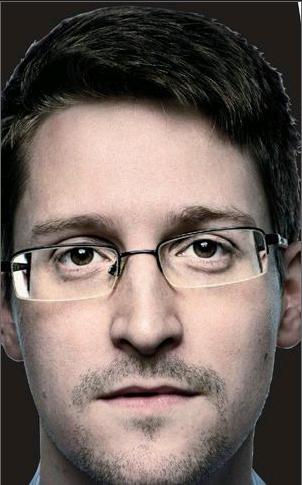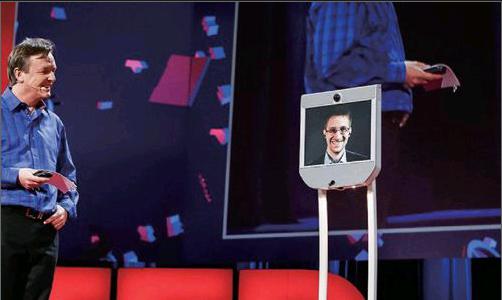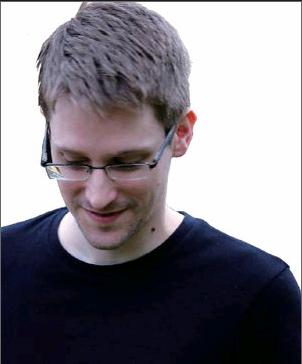The Most Wanted Man in the World
2014-12-24JamesBamford
James+Bamford



2013年6月,美国国家安全局前雇员爱德华·斯诺登向媒体披露了包括“棱镜(PRISM)”计划在内的多个秘密监控项目,制造了美国情报史上规模最大的泄密事件,并自此成为美国在全世界的追捕对象。在此之前,斯诺登有一份令人羡慕的高薪工作,时常和女友去世界各地旅行……但如今,他再也无法回到过去,过无忧无虑的生活。斯诺登为何要同美国政府对着干?这背后的动机何在?是什么让他放弃个人幸福做出如此艰难的抉择?他不顾生命危险捍卫的究竟是什么?前不久,斯诺登在媒体上频繁“露面”,这再一次激起人们心中对这个世界头号“通缉犯”的种种疑问……
The message arrives on my “clean machine,” a MacBook Air loaded only with a sophisticated encryption package. “Change in plans,” my contact says. “Be in the lobby of the Hotel ______ by 1 pm. Bring a book and wait for ES to find you.” ES is Edward Snowden, the most wanted man in the world. For almost nine months, I have been trying to set up an interview with him. Among other things, I want to answer a burning question: What drove Snowden to leak hundreds of thousands of top-secret documents, revelations that have laid bare1) the vast scope of the governments domestic surveillance programs? In May I received an email from his lawyer, ACLU2) attorney Ben Wizner, confirming that Snowden would meet me in Moscow and let me hang out and chat with him for what turned out to be three solid days over several weeks.
Postmodern Whistle-blower
Edward Snowden is a uniquely postmodern breed of whistle-blower. Physically, very few people have seen him since he disappeared into Moscows airport complex last June. But he has nevertheless maintained a presence on the world stage—not only as a man without a country but as a man without a body. When being interviewed at the South by Southwest conference3) or receiving humanitarian awards, his disembodied4) image smiles down from jumbotron5) screens. For an interview at the TED conference in March, he went a step further—a small screen bearing a live image of his face was placed on two leg-like poles attached vertically to remotely controlled wheels, giving him the ability to “walk” around the event, talk to people, and even pose for selfies with them.
Of course, Snowden is still very cautious about arranging face-to-face meetings. I do my best to avoid being followed as I head to the designated hotel for the interview. I take a seat in the lobby facing the front door and open the book I was instructed to bring. Just past one, Snowden walks by, dressed in dark jeans and a brown sport coat and carrying a large black backpack over his right shoulder. He doesnt see me until I stand up and walk beside him. “Where were you?” he asks. “I missed you.” I point to my seat. “And you were with the CIA?” I tease. He laughs.
Entering the room he has booked for our interview, he throws his backpack on the bed alongside his baseball cap and a pair of dark sunglasses. He looks thin, almost gaunt6), with a narrow face and a faint shadow of a goatee, as if he had just started growing it yesterday. He has on his trademark Burberry eyeglasses, semi-rimless with rectangular lenses. His pale blue shirt seems to be at least a size too big, his wide belt is pulled tight, and he is wearing a pair of black square-toed7) Calvin Klein loafers8). Overall, he has the look of an earnest first-year grad student.
Despite being the subject of a worldwide manhunt, Snowden seems relaxed and upbeat as we drink Cokes and tear away at a giant room-service pepperoni9) pizza. His 31st birthday is a few days away. Snowden still holds out hope that he will someday be allowed to return to the US. “I told the government Id volunteer for prison, as long as it served the right purpose,” he says. “I care more about the country than what happens to me. But we cant allow the law to become a political weapon or agree to scare people away from standing up for their rights, no matter how good the deal is. Im not going to be part of that.”
The same day I share pizza with Snowden in a Moscow hotel room, the US House of Representatives moves to put the brakes on the NSA. By a lopsided10) 293-to-123 tally11), members vote to halt the agencys practice of conducting warrantless searches of a vast database that contains millions of Americans emails and phone calls. Its one of many proposed reforms that never would have happened had it not been for Snowden.
A Disillusioned Idealist
Snowden keeps close tabs on12) his evolving public profile, but he has been resistant to talking about himself. In part, this is because of his natural shyness and his reluctance about “dragging family into it and getting a biography.” He says he worries that sharing personal details will make him look narcissistic and arrogant. But mostly hes concerned that he may inadvertently detract from the cause he has risked his life to promote. “Im an engineer, not a politician,” he says. “I dont want the stage. Im terrified of giving these talking heads13) some distraction, some excuse to jeopardize, smear, and delegitimize a very important movement.”
But when Snowden finally agrees to discuss his personal life, the portrait that emerges is not one of a wild-eyed14) firebrand15) but of a solemn, sincere idealist who—step by step over a period of years—grew disillusioned with his country and government.
Born on June 21, 1983, Snowden grew up in the Maryland suburbs, not far from the NSAs headquarters. “Everybody in my family has worked for the federal government in one way or another,” Snowden says. “I expected to pursue the same path.” His father told me, “We always considered Ed the smartest one in the family.” It didnt surprise him when his son scored above 145 on two separate IQ tests.
Rather than spending hours watching television or playing sports as a kid, Snowden fell in love with books, especially Greek mythology. Snowden says reading about myths played an important role growing up, providing him with a framework for confronting challenges, including moral dilemmas. “I think thats when I started thinking about how we identify problems, and that the measure of an individual is how they address and confront those problems,” he says.
Hed loved computers since he was a child, but now that passion deepened. He started working for a classmate who ran his own tech business. Coincidentally, the company was run from a house at Fort Meade, where the NSAs headquarters are located.
Snowden was on his way to the office when the 9/11 attacks took place. Like a lot of civic-minded Americans, Snowden was profoundly affected by the attacks. In the spring of 2004, as the ground war in Iraq was heating up with the first battle of Fallujah, he volunteered for the Army special forces. “I was very open to the governments explanation—almost propaganda—when it came to things like Iraq,” he says. “I still very strongly believed that the government wouldnt lie to us, that our government had noble intent, and that the war in Iraq was going to be what they said it was, which was a limited, targeted effort to free the oppressed. I wanted to do my part.”
Out of the Army, Snowden landed a job as a security guard at a top-secret facility that required him to get a high-level security clearance16). He passed a polygraph17) exam and the stringent background check and, almost without realizing it, he found himself on his way to a career in the clandestine18) world of intelligence. After attending a job fair focused on intelligence agencies, he was offered a position at the CIA.
In 2010, Snowden had shifted from the CIA to the NSA, accepting a job as a technical expert. Among the discoveries that most shocked him was learning that the agency was regularly passing raw private communications—content as well as metadata—to Israeli intelligence. In this case, the NSA did virtually nothing to protect even the communications of people in the US. “I think thats amazing,” Snowden says. “Its one of the biggest abuses weve seen.”
The last straw for Snowden was a secret program he discovered while getting up to speed19) on the capabilities of the NSAs enormous and highly secret data storage facility—the Mission Data Repository in Bluffdale, Utah. Billions of phone calls, faxes, emails, computer-to-computer data transfers, and text messages from around the world flow through the MDR every hour. Some flow right through, some are kept briefly, and some are held forever.
The massive surveillance effort was bad enough, but Snowden was even more disturbed to discover a new cyberwarfare program in the works, codenamed MonsterMind. Snowden views MonsterMind as the ultimate threat to privacy because, in order for the system to work, the NSA first would have to secretly get access to virtually all private communications coming in from overseas to people in the US.
Given the NSAs new data storage mausoleum20) in Bluffdale and the charge to conduct surveillance on all incoming communications, Snowden believed he had no choice but to take his thumb drives21) and tell the world what he knew. The only question was when.
At the same time, he knew there would be dire consequences. “Its really hard to take that step—not only do I believe in something, I believe in it enough that Im willing to set my own life on fire and burn it to the ground.” But he felt that he had no choice. Two months later he boarded a flight to Hong Kong with a pocket full of thumb drives.
The Leakers Concern
More than anything, Snowden fears a blunder that will destroy all the progress toward reforms for which he has sacrificed so much. “Im not self-destructive. I dont want to self-immolate and erase myself from the pages of history. But if we dont take chances, we cant win,” he says. And so he takes great pains to stay one step ahead of his presumed pursuers—he switches computers and email accounts constantly. Nevertheless, he knows hes liable to be compromised22) eventually: “Im going to slip up23) and theyre going to hack me. Its going to happen.”
Another concern for Snowden is what he calls NSA fatigue—the public becoming numb to disclosures of mass surveillance, just as it becomes inured24) to news of battle deaths during a war. “One death is a tragedy, and a million is a statistic,” he says.
In the end, Snowden thinks we should put our faith in technology—not politicians. “We have the means and we have the technology to end mass surveillance without any legislative action at all, without any policy changes.” The answer, he says, is robust encryption. “By basically adopting changes like making encryption a universal standard—where all communications are encrypted by default—we can end mass surveillance not just in the United States but around the world.”
Until then, Snowden says, the revelations will keep coming. “We havent seen the end,” he says. Indeed, a couple of weeks after our meeting, The Washington Post reported that the NSAs surveillance program had captured much more data on innocent Americans than on its intended foreign targets. There are still hundreds of thousands of pages of secret documents out there—to say nothing of the other whistle-blowers he may have already inspired. But Snowden says that information contained in any future leaks is almost beside the point25). “The question for us is not what new story will come out next. The question is, what are we going to do about it?”
一条信息出现在了我的苹果MacBook Air笔记本电脑上,这台电脑很“干净”,只装有一套精密的加密程序包。“计划有变,”我的联系人说,“请于下午一点前到达XX酒店大厅。拿上一本书,等着ES去找你。”ES就是爱德华·斯诺登,世界头号“通缉犯”。在将近九个月的时间里,我一直试图安排一次对他的采访。在各式各样的疑问中,我想要解答一个十分紧要的问题:到底是什么促使斯诺登泄露了数十万份绝密文件,使美国政府大范围的国内监控项目曝光?今年5月,我收到他的律师——美国公民自由协会律师本·威茨纳——发来的一封电邮,确认斯诺登将会在莫斯科与我会面,并将在会面后的几周里抽出时间与我一起闲逛、聊天,结果他抽出了整整三天的时间。
后现代的揭秘者
爱德华·斯诺登是个独一无二的后现代型揭秘者。自去年6月他在莫斯科机场大楼消失以来,很少有人见过他本人。但他却从没离开过世界舞台—— 一个既没有国家,又从不暴露真身的人。当他在西南偏南大会接受采访或是领取各种人道主义奖时,他那脱离了真实躯体的影像会从巨大的电子屏幕上朝下边微笑。在今年3月举行的TED大会上接受采访时,他又更进一步:一面展示他实时面部影像的小型屏幕被安在两根像腿一样的支杆上,这两根支杆又被竖着连接在远程遥控的轮子上,这样他就能在会场上四处“走动”,与人交谈,甚至摆姿势和人们自拍。
当然,斯诺登对于面对面会见的安排还是十分谨慎的。在前往指定酒店进行采访时,我尽一切努力避免被人跟踪。我在大厅里找了个面朝正门的位子坐了下来,然后打开那本被要求携带的书。一点刚过,斯诺登就从我身旁走了过去。他穿着一条深色牛仔裤,一件棕色运动上衣,右肩上挎着一只大号的黑色双肩包。他没有看到我,我只好站起来,走到他身边。“你刚才在哪儿?”他问道,“我没有看到你。”我指了指我的位子。“你刚刚是和中情局的人在一起吗?”我打趣说。他大笑起来。
走进他为我们这次采访预订的房间后,斯诺登将背包扔到床上,和他的棒球帽以及一副深色太阳镜放在一起。他看起来很瘦,几乎到了瘦削的程度,狭长的脸上留着一抹淡淡的山羊胡,仿佛是昨天才刚开始长出的一样。他戴着他那标志性的博柏利牌眼镜,半边框的镜框上镶着长方形的镜片。他那淡蓝色的衬衣看起来至少要大一号,宽大的腰带扎得很紧,脚上穿着一双黑色方头的CK平底鞋。总之,他看起来就像个真诚的一年级研究生。
尽管斯诺登是全球追捕的目标,但在我们边喝可乐边扯着酒店客房服务送来的一张巨大的意式辣味香肠比萨大快朵颐时,他似乎既放松又乐观。再过几天就是他31岁的生日了。斯诺登仍然希望有朝一日他能被允许重返美国。“我和政府说过我愿意坐牢,只要这样做有一个正当的理由,”他说,“与个人遭遇相比,我更关心这个国家。但我们不能让法律成为政治的武器,也无法容许有人恐吓民众,使他们不敢维护自己的权利,不管这交易有多么诱人。这样的事我决不会参与。”
就在我和斯诺登在莫斯科一家酒店房间里分享比萨的那天,美国众议院提出动议,要遏制美国国家安全局的行动。国安局在未经许可的情况下即可对一个包含数百万美国人电子邮件和通话记录的庞大数据库进行搜索。通过投票,议员们以293比123的压倒性票数终止了国安局的这一行为。这只是斯诺登促成的为数众多的改革议案之一,要不是斯诺登,这样的改革永远不会发生。
幻灭的理想主义者
斯诺登密切关注自己公众形象的变化,但他一直不愿意谈论自己。究其原因,部分是因为他生性腼腆且不愿“将家人牵扯进去,并被人写成传记。”他说他担心公开自己的个人详细信息会使他看起来自恋而傲慢。但更主要的原因是他担心这会在无意中分散人们的注意力,使人们不再关注他冒着生命危险去推动的事业。“我是工程师,而不是政客,”他说,“我不想要舞台。我害怕我会转移那些评论员的注意力,给他们一些借口去破坏、抹黑这样一个非常重要的运动,并否认其正当性。”
但当斯诺登最终同意谈论他的个人生活时,他所展示出的形象并不是一个极端、狂热的煽动分子,而是一个严肃、真诚的理想主义者。在过去的几年中,这个理想主义者对自己的国家和政府逐渐感到幻灭。
斯诺登出生于1983年6月21日,在马里兰州的郊区长大,那里离国家安全局总部不远。“我们家每个人都曾以这样或那样的方式为联邦政府工作过,”斯诺登说,“我也想走同样的道路。”斯诺登的父亲曾对我说过:“我们总觉得爱德(译注:斯诺登的昵称)是我们家最聪明的人。”当斯诺登在两次不同的智商测试中都取得了145分以上的成绩时,他的父亲并未感到惊讶。
小时候,斯诺登并没有把大量时间花在看电视或体育运动上,而是爱上了读书,尤其是希腊神话。斯诺登说阅读神话在他的成长过程中起到了重要的作用,为他提供了一个应对挑战的框架,这些挑战也包括道德困境。“我觉得我就是从那时开始思考我们该如何发现问题的。也是从那时起我开始意识到,衡量一个人的标准就在于看其如何解决和应对这些问题。”他说。
他从小就喜爱电脑,但现在这种喜爱更加深了。他开始在一个同学那里工作,这位同学经营着自己的技术公司。巧合的是,这家公司的办公地点就在米德堡,也就是国家安全局总部的所在地。
9·11袭击事件发生时,斯诺登正在上班的路上。和许多有公民意识的美国人一样,斯诺登也深受袭击事件的影响。2004年春,当伊拉克的地面战争随第一次费卢杰战役的打响而逐渐升温时,斯诺登志愿加入了美国陆军特种部队。“以前但凡涉及像伊拉克这样的问题,我都非常乐于听信政府的解释——虽然这种解释几乎就是宣传,”他说,“那时我仍然坚信政府不会对我们撒谎,坚信我们的政府怀有高尚的目的,坚信伊拉克战争将会像他们所说的那样,是一场有限的、有特定打击目标的、解放被压迫者的战争。我想尽自己的一份力量。”
从部队退役后,斯诺登在一家绝密级的机构找到了一份保安员的工作,这家机构要求他必须获得高级别的安全许可方可上岗。他通过了测谎试验以及严格的背景调查,几乎是在自己都没意识到的情况下,他发现自己踏上了通往秘密情报世界的职业旅程。在参加了一场以情报机构为主的招聘会后,斯诺登在中央情报局谋得了一份工作。
2010年,斯诺登从中情局调往国安局,担任技术专家。在那里他有了许多令他非常震惊的发现,其中之一就是他得知国安局会将原始的私人通讯记录——包括通讯内容及元数据——定期传给以色列的情报机构。在这种情况下,国安局其实没有采取任何保护措施,甚至连美国人的通讯记录也得不到保护。“我认为这太不可思议了,”斯诺登说,“这是我们所见过的最严重的职权滥用。”
让斯诺登最终无法容忍的是他所发现的一个秘密项目。那是他在了解国安局高度机密的大型数据存储设备——位于犹他州布拉夫代尔的“任务数据存储库”——的处理能力时所发现的。每个小时,都有数以亿计的来自世界各地的电话、传真、电子邮件、电脑间的数据传输以及手机短信从这台“任务数据存储库”中流过。有些数据直接流了过去,有些被短暂保存,有些则被永久保留下来。
这种大规模的监控行为已经够离谱的了,但更令斯诺登感到不安的是他在这一设施中又发现了一个代号为“怪兽大脑”的新的网络战争计划。斯诺登认为“怪兽大脑”是对人类隐私的终极威胁,因为要使这一系统正常运转,国安局就必须先秘密地获取从海外发给美国公民的几乎所有私人通讯内容。
鉴于国安局位于布拉夫代尔的这一新型数据存储设施,以及要对所有进入美国的通信内容进行监控的任务,斯诺登认为自己别无选择,只能拿上手里的U盘,将他所知道的一切公之于众。唯一的问题是:何时采取行动。
与此同时,他深知这样做会带来严重的后果。“走出这一步真的很难——不仅因为我有信仰,还因为我的信仰足以使我愿意引火烧身,哪怕化为灰烬。”但他觉得自己别无选择。两个月之后,斯诺登在口袋里装满了U盘,登上了一架飞往香港的班机。
泄密者的忧虑
在所有事情中,斯诺登最担心的是,一次严重的失误就会令为争取改革而取得的所有进步都毁于一旦,而为了这些改革,他已做出如此巨大的牺牲。他说:“我并非是在自我毁灭。我不想把自己作为祭品献出去并将自己从历史的篇章中抹去。但如果我们不去冒险,就无法取得胜利。”因此,他费尽心思,要比他所设想的那些追踪者快上一步——他不停地更换电脑和电邮账户。然而他知道,他最终很有可能会陷入危险之中。“我总会有疏忽大意的时候,那他们就能通过黑客手段找到我。这是迟早的事。”
斯诺登的另一个忧虑是他所谓的“国安局疲劳症”——公众对大规模监控行为的披露渐渐感到麻木,就像在战争期间习惯了对战斗死亡的报道一样。“一个人的死亡是悲剧,而一百万人的死亡则是数据。”他说。
最后,斯诺登认为我们应该相信技术,而不是政客。“我们有各种手段和技术来终止大规模的监控行为,而无需任何立法行为,也无需任何政策上的改变。”他说,问题的答案就在于使用强大的加密技术。“要从根本上进行改变,比如让加密成为一种通用的标准——所有的通讯内容都要默认加密——那么我们不仅能终止美国的大规模监控行为,在世界范围内都将如此。”
在实现这一步之前,斯诺登说,泄密事件还是会不断发生。“我们还没有看到结束的迹象。”他说。的确,就在我们见完面的几周后,《华盛顿邮报》就报道说国安局的监控计划所捕获的无辜美国人的数据要远远多于其所针对的外国目标的数据。那里仍有成千上万页的秘密文件在等待披露——更何况还可能会有其他已经受到斯诺登启发的揭秘者。但斯诺登说,将来的所有泄密事件会披露什么样的信息几乎无关紧要。“对我们来说,问题不在于还会有什么新的真相被揭露出来。问题在于,对此我们将做些什么?”
1. lay bare:揭露;揭发;使暴露
2. ACLU:American Civil Liberties Union的缩写,美国公民自由协会
3. South by Southwest conference:指西南偏南大会(简称SXSW大会),是每年在美国得克萨斯州奥斯汀举行的一系列电影、交互式多媒体和音乐的艺术节与大会。
4. disembodied [?d?s?m?b?did] adj. 似脱离人而存在的;无实体的
5. jumbotron [?d??mb??tr?n] n. (电视机的)超大屏幕
6. gaunt [ɡ??nt] adj. 瘦削的
7. square-toed:方头鞋的
8. loafer [?l??f?(r)] n. 平底便鞋
9. pepperoni [?pep??r??ni] n. (常放在比萨饼中的)意大利辣味香肠
10. lopsided [?l?p?sa?d?d] adj. 悬殊的;严重不平衡的
11. tally [?t?li] n. 计数;比分
12. keep tabs on:密切注意,严密监视
13. talking head:(在电视讨论或访谈节目中的)专家,权威的评论家
14. wild-eyed:极端而狂热的
15. firebrand [?fa??(r)?br?nd] n. (总是煽动事端的)狂热分子;(尤指)政治煽动者
16. clearance [?kl??r?ns] n. (官方的)批准,许可
17. polygraph [?p?li?ɡrɑ?f] n. 测谎(试验)
18. clandestine [kl?n?dest?n] adj. 暗地里的,秘密的
19. up to speed:了解情况的;掌握最新信息的
20. mausoleum [?m??s??li??m] n. 大而阴森的建筑物;阴冷的大房间
21. thumb drive:拇指驱动器,U盘
22. compromise [?k?mpr?ma?z] vt. 连累;危及
23. slip up:出小差错
24. inured [??nj??(r)d] adj. 对(令人不快的事物)司空见惯的;习惯于……的
25. beside the point:不相关的
